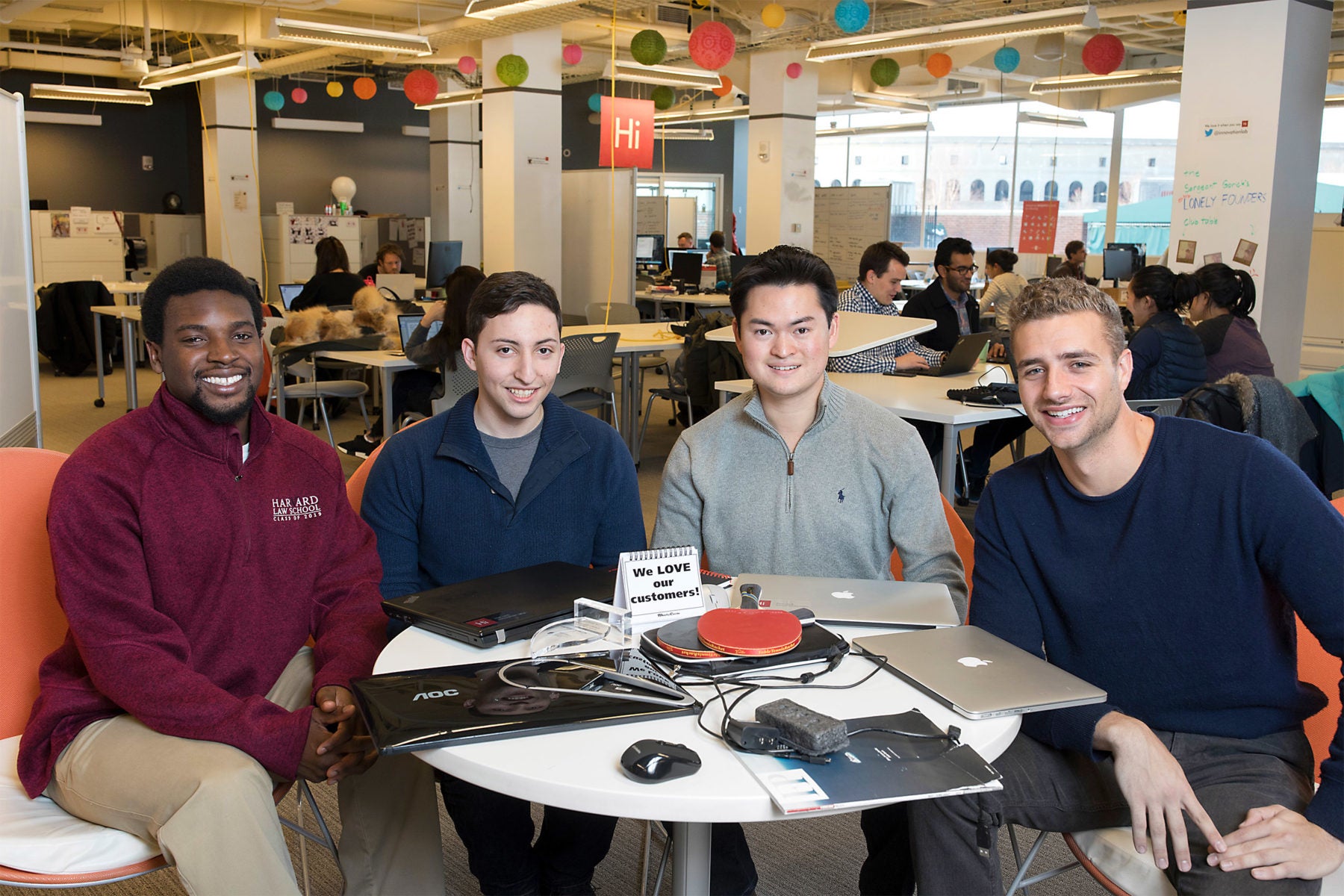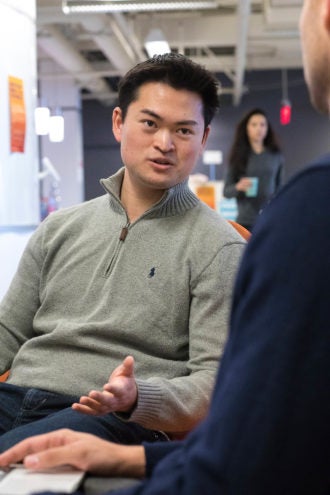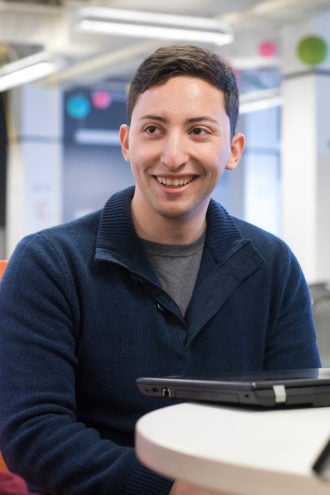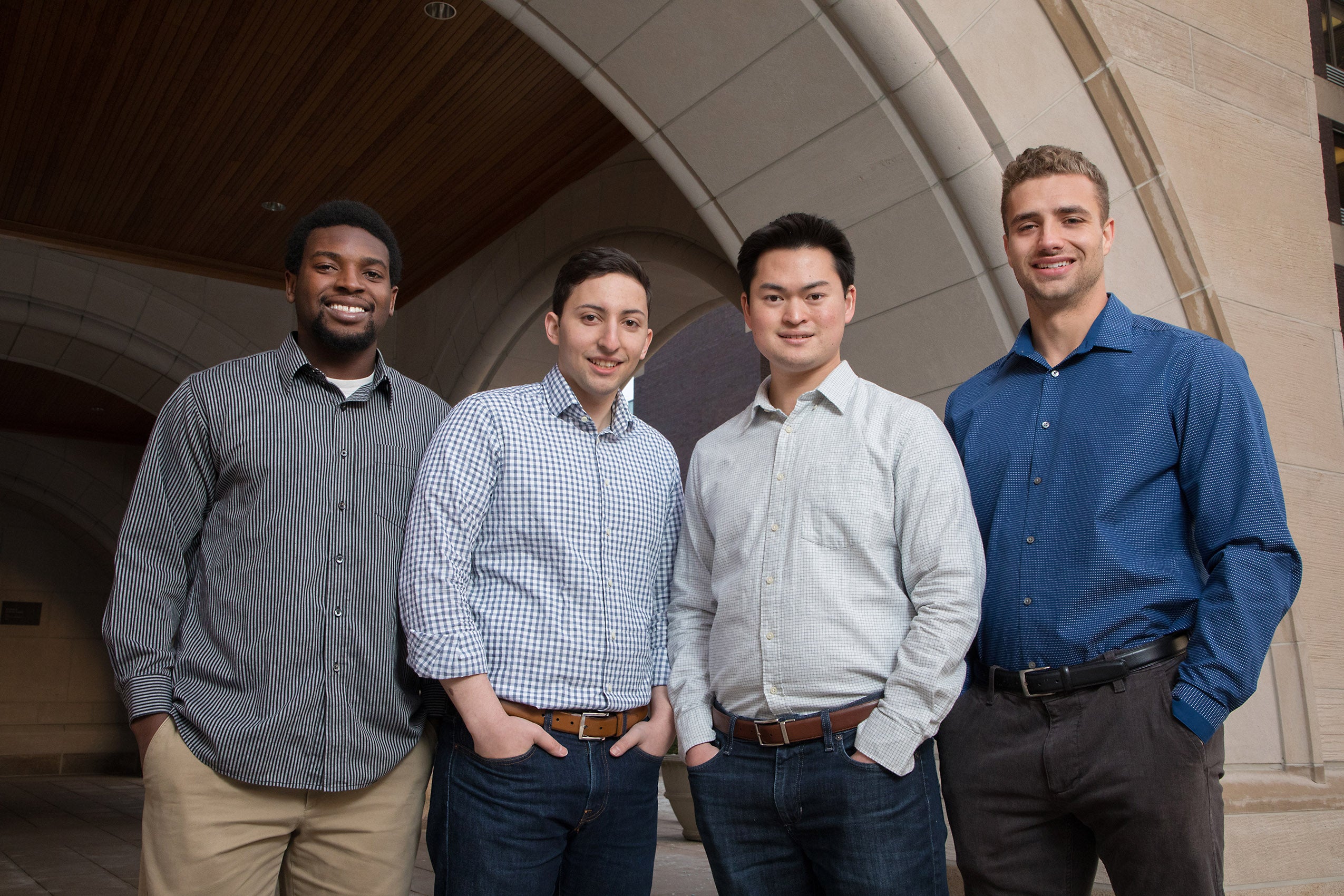Four Harvard Law students have their heads in the cloud—and they think the rest of the legal profession should join them. With their powerful new search engine called Evisort that harnesses cloud storage and artificial intelligence, they hope to revolutionize the costly and labor-intensive way that lawyers currently handle contracts and other transactional work, liberating them for more creative and interesting tasks.
Developed by the students over the past two years, Evisort is “like Google for legal contracts,” says Jerry Ting ’18, co-founder and CEO, who came up with the idea as an undergraduate. While artificial intelligence is the cutting-edge of automating labor-intensive tasks such as document review, it hasn’t yet been widely applied to contracts. Evisort jumps into that gap by enabling lawyers to quickly sort through thousands of contracts and other documents to unlock key insights for transactional work. It has the potential to greatly enhance efficiency, improve accuracy, and save millions of dollars a year, the students and their supporters agree.
“When we say, ‘Hey, in six seconds we can review a 30-page contract and pull out information for you,’ lawyers say, ‘Why did I spend 10 years of my life doing that?’ That reaction is what gets us excited to keep going.”
“Our goal is to help lawyers by building something that makes their lives easier and better,” says Jacob Sussman ’18, one of the trio of co-founders, along with Ting and an MIT student. “Lawyers should never be starting from scratch when they’re drafting a contract, they should be building from what they’ve done before. Or in answering a question, it’s likely contained in something they’ve already done. If they can get it—and don’t have to spend a lot of time getting it—great!”
Evisort first converts scanned documents to searchable text—nothing new here. But it’s the next steps that have a revolutionary application for lawyers. Using artificial intelligence, Evisort sorts through all the contracts, categorizing them by subject area and type of contract, and identifies provisions within each contract. A whole range of key data is extracted such as party names, dates, and size of the deal.
Let’s say a salesperson in the middle of closing a high-value deal comes to general counsel seeking guidance on negotiating a provision on the limitation of liability. Right now, the lawyer can do a word search for “limitation on liability” among the contracts the legal team has access to in order to find relevant contracts, but she would have to open each one to read it and see if it’s helpful. Evisort, however, instantly scans every contract in the entire company that includes a limitation on liability—pulling up only those within certain date or other parameters that the lawyer wants, such as only within sales agreements. It presents this data in chart form showing when the contract was signed, how much money was involved in the deal, the language of the limitation on liability—without the lawyer having to read each document.
“You can instantly see 20 or 40 limitation of liability provisions within your defined parameters,” says Ting, “and you can look at different cross-sections of data that you couldn’t before and use that to better benchmark and negotiate your position. Depending on the company’s preferences, Evisort can find not just the documents that you as the lawyer signed but everything anyone in company has ever signed. That’s why this is transformational. It’s like having a paralegal who knows every single word in everything you ever signed, and can pull it up for you—in chart form—24/7.”
When a lawyer can quickly find useful data in contracts and other agreements, instead having to manually pore over them, they can function more as business partners within a company, Ting says; for example, by informing the sales staff when sales agreements are up for renewal, they can help improve revenues.

Onwudiwe, Sussman, Ting and Hawkins at the Harvard Innovation Lab
Memme Onwudiwe ’19, executive vice president of sales, joined as a 1L at Ting and Sussman’s invitation, and he and Riley Hawkins ’19, director of business development, are Evisort’s sales team. “It’s a paradigm shift,” says Onwudiwe. “Where a paralegal can go through, say, hundreds of contracts and tag five key provisions in each one, if a sixth provision is needed, the work would have to start all over.” Evisort, by contrast, can tag an ever-growing list of important data points and make it easily searchable.
In focusing on transactional work, Evisort will revolutionize the legal profession much as e-discovery transformed litigation over the past decade, the team believes. And their HLS advisors agree that Evisort could change the way law is practiced.
“By tapping into the use of artificial intelligence and machine learning to review agreements, Evisort has real potential to lower costs without sacrificing accuracy and precision,” says Christopher T. Bavitz, WilmerHale Clinical Professor of Law and Managing Director of the Cyberlaw Clinic at the Berkman Center for Internet & Society, and a mentor to the Evisort students.
The legal industry “is notoriously slow to change and is ripe for innovation,” Bavitz says, so “there exist tremendous opportunities to identify and exploit efficiencies in how lawyers serve clients and how companies manage information relevant to their legal and compliance obligations.” This is particularly the case when it comes to reviewing provisions in contracts, “a common legal function that is tailor-made for natural-language processing,” he adds.
Currently in its first round of fundraising, Evisort is drawing huge interest from general counsel at major companies and other thought leaders in the legal profession. The team has already spoken with and given product demonstrations to more than 100 HLS alumni and another 200 lawyers, most of them general counsel, who are typically more open to innovation than law firm lawyers, the students have found.
“When we say, ‘Hey, in six seconds we can review a 30-page contract and pull out information for you,’ lawyers say, ‘Why did I spend 10 years of my life doing that?’” Ting says. “That reaction is what gets us excited to keep going.”
“People want this change,” agrees Sussman. One of the first phone calls they made, last year, to an HLS alumna who is a corporate general counsel, really sticks with him. “When we described what we had, she said, ‘Jake, I’ve been waiting for this call for 20 years.’ She said she knew technology could help her job but she didn’t know where to start. Word processors changed the legal industry, and this will be the same. It’s time for the next shift.”
With a new accounting rule, ASC 606, which alters how companies must recognize revenue from customer contracts, Evisort is surfing a particularly propitious moment, Ting says. “Because of this change, GC and CFOs are working more closely together than ever before,” he says. In addition, deals are generally more complex and global in nature. “GC are really being asked to understand a lot of data,” which is where AI is crucial, he says.
This fall, Evisort won best presentation at the Lee Kuan Yew Global Business Plan Competition in the services category, competing in Singapore against over 500 other startups from over 65 different countries. In December at HLS, at Bavitz’s invitation, Ting presented Evisort to representatives from over 24 state attorneys general offices. “They were excited about the use of natural language processing on contracts and legal documents because … they spend a lot of resources, which they don’t have much of, looking for data within legal documents,” Ting says.
***
It was as an undergraduate intern at the U.S. Supreme Court in 2013 that Ting first got the idea for Evisort. Coming from the San Francisco Bay Area, with many friends who are coders, Ting was shocked to see the old-fashioned way the high court handled data. “It was crazy to see the highest court push around bins and bins of paper for evidence,” he says. Not only is cloud storage far more efficient and reliable, it also has far less impact on the environment. Ting began to consider how artificial intelligence could assist in litigation, and he came up with the name Evisort, for Evidence Sort.

Jerry Ting ’18
After college, Ting worked on a sales team at Yelp and he planned to become a startup attorney. But once he matriculated at HLS and began to understand how lawyers handle contracts, he realized that his idea could have a real impact on transactional law, and he pivoted away from a litigation focus.
“As a 1L, I did a lot of networking, talking to professors and alumni, and a common thread was that people were spending a lot of time looking for language, clauses, precedents, dates, and party names” in contracts, he says. “It really was a manual process. I knew even that Microsoft Excel could do things to help attorneys. But why aren’t they doing it? I thought, ‘I need to go find someone [to build the platform] because this is a billion-dollar opportunity.’”
In the spring of 2016, Ting was part of the Harvard Law Entrepreneurship Project (HLEP), where he and other law students are paired with lawyers and entrepreneurs to work on startups. There, he met an MIT student, an expert in artificial intelligence, who jumped at Ting’s Evisort idea and joined as a co-founder.

Jacob Sussman ’18
The following fall, Ting asked Sussman to join as the third co-founder and COO. Together, the two contacted over 200 corporate GC to get feedback on their idea, and they hired two computer engineering students from Northeastern University to join the development team. They also asked Onwudiwe and Hawkins ’19 to become the sales force.
Around the same time, the co-founders and Bavitz met with then-HLS Dean Martha Minow, who was enthusiastic about their idea. “That really opened a lot of things from the institution,” says Ting, including interest from other HLS professors, and the team began to work at the Harvard Innovation Lab (i-lab), a collaboration and education space designed to foster entrepreneurship and innovation across Harvard. HLS Professor of Practice Scott Westfahl, director of the law school’s Executive Education program, proved essential in connecting the students with the real-world needs of corporate attorneys and understanding how legal departments make decisions.
For now, even as they manage their law school course work, the four HLS students are putting in long hours developing a product they see as course-changing for the profession. And the interest continues to grow in Evisort.
Next month, Ting will be speaking to 200 attorneys at the Harvard Law School Association of New York City about the impact of artificial intelligence on the law.
“It’s a very exciting time,” says Ting. “There’s a lot happening.”
